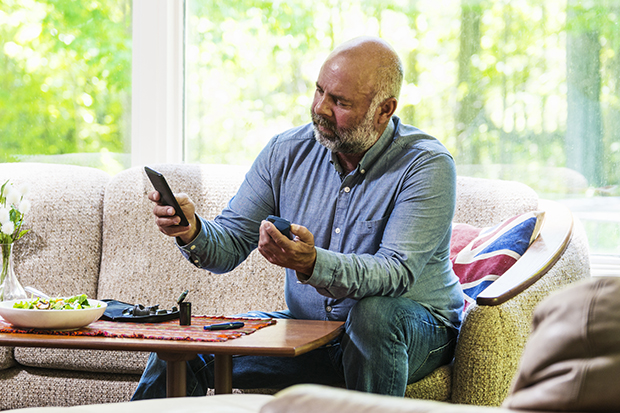The Surprising Connection Between Type 2 Diabetes and Obstructive Sleep Apnea

Submitted by Beth Hamann, Koala Center for Sleep Disorders
Does the following sound familiar? You wake up each day feeling restless and groggy, only to find that your blood sugar levels are out of control. You’re too tired to exercise and instead find yourself reaching for junk food to give you a quick burst of energy. If this has become your routine, you’re not alone, and you might be surprised at what’s behind it.
Why sleep is important
Commonly cited risk factors for diabetes include obesity, family history, and ethnicity as well as high blood pressure, aging, and inactivity, according to the ADA. However, when was the last time you heard about the connection between poor sleep and diabetes? The truth is that the two often go hand in hand.
The National Sleep Foundation has known for years that inadequate sleep impacts the body’s ability to control hormone and glucose levels, meaning that not sleeping enough could put you at risk for developing diabetes or worsening existing diabetes. However, even getting a full night’s sleep doesn’t mean you aren’t at risk. If your sleep is disrupted or your sleep patterns are irregular, you could still be in trouble. There seems to be a connection between the amount of deep sleep a person gets and regulation of blood glucose levels. According to the National Sleep Foundation, when a person is in deep sleep, the brain uses less glucose and hormone levels stabilize. As such, it is very important that those already diagnosed with or at risk for type 2 diabetes get enough deep sleep.
Sleep apnea and diabetes
One sleep condition researchers have connected to type 2 diabetes is Obstructive Sleep Apnea (OSA). A 2009 American Journal of Medicine study found sleep apnea to increase a person’s risk for developing diabetes. A 2012 study in Science Translational Medicine showed that sleep disruption decreased insulin secretion while increasing blood glucose levels. Additionally, researchers at the University of Chicago found that if someone has Type 2 diabetes, it is likely that this condition could worsen if they also have OSA. One of the reasons for this is that OSA disrupts the deepest stage of sleep. The condition is characterized by complete airway obstruction, which can occur when the tongue and muscles relax during sleep, the lower jaw falls back toward the throat or the airway becomes blocked. These obstructions may cause a person to stop breathing and briefly awaken hundreds of times a night. If you are diabetic or prediabetic, these sleep disruptions not only cause glucose levels to go haywire but also can leave you feeling overly hungry and too tired to exercise the next day.
Treating Obstructive Sleep Apnea
If you currently have diabetes, or are at risk for developing it, and you are experiencing inadequate sleep or snoring, consider talking with your doctor about a sleep study, which can determine whether or not you have OSA. Treatment options may include lifestyle changes, surgery, Continuous Positive Airway Pressure (CPAP), and Oral Appliance Therapy.
Oral Appliance Therapy has proven to be an effective, scientifically based treatment option for snoring and OSA. The purpose of the appliance is to hold the jaw in a position that allows the airway to remain as open and firm as possible during sleep. Oral appliances are similar to athletic mouth guards but less bulky and completely non-invasive. Oral sleep appliances are covered by most medical insurance plans and Medicare.
Treating OSA could lead to…
- A better night’s sleep
- Reduced stress
- More stable blood glucose levels
- Reduced insulin resistance
- Improved energy
- Increased motivation to exercise
- Greater control over snacking
- Better moods
For more information, contact Dr. Rod Willey at the Koala Center for Sleep Disorders. As a general dentist with a Diplomate from the Academy of Clinical Sleep Disorders Disciplines and American Sleep and Breathing Academy, Dr. Willey has dedicated his practice to the treatment of snoring, sleep apnea, and TMJ Disorders with oral appliance therapy. To contact him call 309-565-8149 or visit KoalaSleepCenters.com/Peoria.
